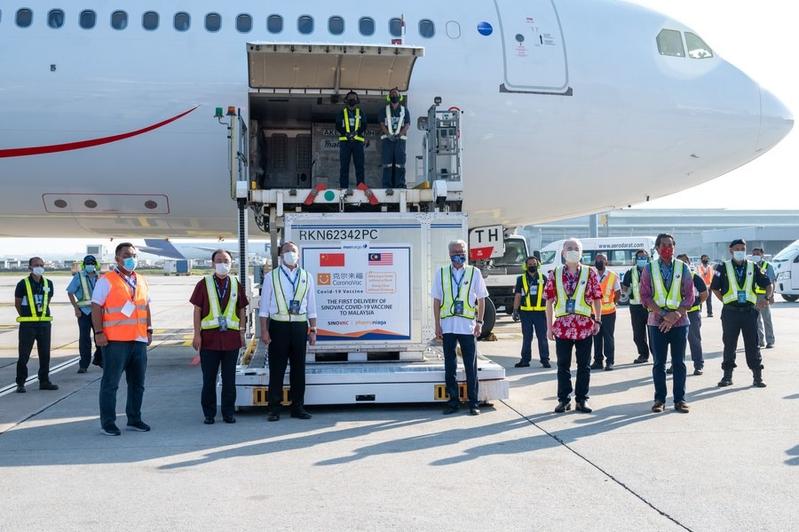 Chinese Ambassador to Malaysia Ouyang Yujing (2nd left, front), Malaysia's Defence Minister Ismail Sabri Yaakob (3rd right, front), Transport Minister Wee Ka Siong (2nd right, front), Foreign Minister Hishammuddin Hussein (3rd left, front), Science, Technology and Innovation Minister Khairy Jamaluddin (1st right, front) pose for photos next to the first batch of COVID-19 vaccines made by the Chinese biopharmaceutical company Sinovac Biotech at the Kuala Lumpur International Airport in Sepang, Malaysia, Feb 27, 2021. (PHOTO / XINHUA)
Chinese Ambassador to Malaysia Ouyang Yujing (2nd left, front), Malaysia's Defence Minister Ismail Sabri Yaakob (3rd right, front), Transport Minister Wee Ka Siong (2nd right, front), Foreign Minister Hishammuddin Hussein (3rd left, front), Science, Technology and Innovation Minister Khairy Jamaluddin (1st right, front) pose for photos next to the first batch of COVID-19 vaccines made by the Chinese biopharmaceutical company Sinovac Biotech at the Kuala Lumpur International Airport in Sepang, Malaysia, Feb 27, 2021. (PHOTO / XINHUA)
Chinese vaccines and support for vaccine research have helped Malaysia scale up its COVID-19 pandemic response and successfully roll out its mass inoculation drive, analysts said.
The nation's vaccination success stems from efficient management of the program, a widespread information campaign and a diverse vaccine portfolio that ensures continuous supply, they said, noting the important role played by Chinese vaccine supplies and cooperation.
Malaysia has one of the world's highest vaccination rates, with more than 60 percent of the population fully vaccinated as of Monday.
Vaccines from China's Sinovac and Pfizer-BioNTech accounted for roughly 90 percent of more than 42 million doses that have been administered in the country since its mass vaccination drive started in February. Apart from that, Malaysia also bought and administered vaccines developed by AstraZeneca and China's CanSino Biologics.
Yahya Mat Arip, associate professor in the biological sciences school at public research university Universiti Sains Malaysia, said the CanSino vaccine, in particular, has helped in immunizing some marginalized communities and the homeless.
"With a single dose of CanSino vaccine, one can get vaccinated and be done with it," Yahya said. "After 28 days, an individual who received the CanSino vaccine would be considered fully vaccinated."
He noted that CanSino benefits people who cannot easily access vaccines. These include homeless people who are always on the move and the indigenous Orang Asli people who live in remote areas.
Yahya also said the Sinovac vaccine is ideal for vaccination in Malaysia's small villages as the jabs do not require storage at ultralow temperatures.
Chan Chee Khoon, an epidemiologist and health policy analyst with the Kuala Lumpur-based advocacy group Citizens' Health Initiative, said a partnership between Sinovac and Pharmaniaga, Malaysia's biggest pharmaceutical company, is the "first step toward a much-needed mature manufacturing capability in Malaysia which can be repurposed in a (future) outbreak".
Pharmaniaga entered into an agreement with Sinovac in January to buy ready-to-fill vaccines. Six months later, Pharmaniaga fulfilled a contract to supply the Malaysian government with 20.4 million vaccine doses.
Gathering speed
The Malaysian government launched its immunization program in February, with healthcare workers and other frontline personnel among the first groups of people to be inoculated. But supply was insufficient in the first half of the year, slowing down the pace of the vaccine rollout.
However, vaccinations gathered speed in the third quarter with the entry of more vaccine doses.
The adequate supply was complemented by the establishment of over 1,000 centers nationwide that operate even on weekends and public holidays, so that Malaysians can get vaccinated anytime and anywhere.
Chan complimented the government's "well-organized, ramped-up vaccine rollout". But he is hoping that the authorities will also reach out to the estimated 3 million undocumented migrant workers who were reluctant to surface for vaccination because their fears of arrest and deportation were exacerbated by contradictory messaging.
As Malaysia's vaccination rate increases, the government has slowly begun opening up the economy. The resort island of Langkawi was reopened for domestic tourists on Sept 16. Fully vaccinated people are now allowed to dine in restaurants, go camping and visit night markets.


